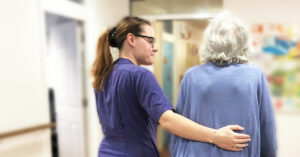

Biomedical scientists carry out tests which assist with the diagnosis and treatment of diseases. There are different disciplines to biomedical science.
I work in Blood Sciences, specifically haematology and blood transfusion. Haematology is the study of blood and blood forming tissues. Blood transfusion relates to blood being given to a patient, for example during an operation. I process blood samples by carrying out routine or specialised tests.
When a patient needs a blood transfusion, I make sure that the right type of blood is given to them. I also carry out quality control on equipment and machines to make sure that they are working correctly.
I studied biology, chemistry and maths at A-Level and I had an interest in science. I didn’t get into medicine so I decided to study biomedical science at university. As part of this degree, I learnt about the human body. Before you can register to practise as a biomedical scientist, you must complete a year of training in a specific discipline or as a multi-disciplinary where you spend time in different fields. This can be done during a placement as part of your university degree or after graduation.
I needed to complete a year of training after graduating but trainee positions were limited so I worked as a Sterile Services Technician, and then as a Medical Lab Assistant , while I waited for an opening as a Trainee Biomedical Scientist to come up. After completing my trainee year, I was signed off by the Institute of Biomedical Science and I could then become a registered biomedical scientist with the Health and Care Professions Council (HCPC).




